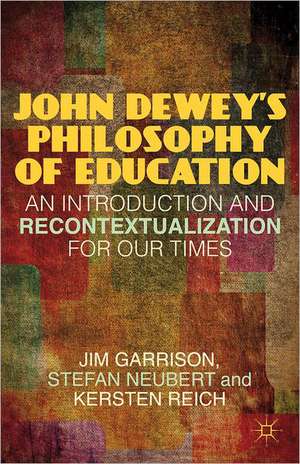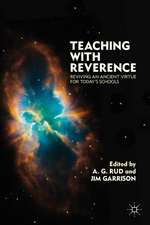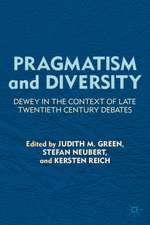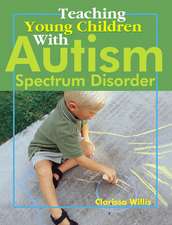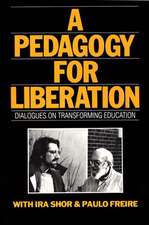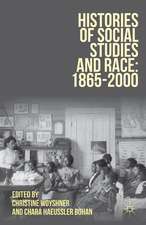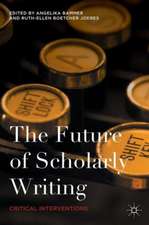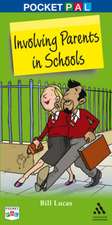John Dewey’s Philosophy of Education: An Introduction and Recontextualization for Our Times
Autor J. Garrison, S. Neubert, K. Reichen Limba Engleză Hardback – 6 sep 2012
| Toate formatele și edițiile | Preț | Express |
|---|---|---|
| Paperback (1) | 522.24 lei 6-8 săpt. | |
| Palgrave Macmillan US – 6 sep 2012 | 522.24 lei 6-8 săpt. | |
| Hardback (1) | 526.35 lei 6-8 săpt. | |
| Palgrave Macmillan US – 6 sep 2012 | 526.35 lei 6-8 săpt. |
Preț: 526.35 lei
Preț vechi: 619.24 lei
-15% Nou
Puncte Express: 790
Preț estimativ în valută:
100.72€ • 104.95$ • 83.39£
100.72€ • 104.95$ • 83.39£
Carte tipărită la comandă
Livrare economică 03-17 aprilie
Preluare comenzi: 021 569.72.76
Specificații
ISBN-13: 9781137026170
ISBN-10: 1137026170
Pagini: 213
Ilustrații: XVII, 213 p.
Dimensiuni: 140 x 216 x 18 mm
Greutate: 0.39 kg
Ediția:2012
Editura: Palgrave Macmillan US
Colecția Palgrave Macmillan
Locul publicării:New York, United States
ISBN-10: 1137026170
Pagini: 213
Ilustrații: XVII, 213 p.
Dimensiuni: 140 x 216 x 18 mm
Greutate: 0.39 kg
Ediția:2012
Editura: Palgrave Macmillan US
Colecția Palgrave Macmillan
Locul publicării:New York, United States
Cuprins
Introduction
PART I: EDUCATION AND CULTURE – THE CULTURAL TURN
Nature and Culture
Culture and Experience
Education and Social Life
Formal and Informal Education
Interaction, Transaction, and Communication
Selection of Target Texts
PART II: EDUCATION AS RECONSTRUCTION OF EXPERIENCE – THE CONSTRUCTIVE TURN
Experience and Education: The biological Dimension
Experience and Education: The social Dimension
Experience and Education: Growth
The Reflex Arc Concept
Habits, Impulse, and Intelligence
Inquiry and the Five Steps of Research and Reflective Learning
Re/De/Construction
Selection of Target Texts
PART III: EDUCATION, COMMUNICATION, AND DEMOCRACY – THE COMMUNICATIVE TURN
Education and Communication
Learning and Joint Activities
The Democratic Vision
Participation and Diversity
Social Intelligence and Democratic Reconstruction
Selection of Target Texts
PART IV: CRITICISM AND CONCERNS – RECONSTRUCTING DEWEY FOR OUR TIMES
Introduction
Bauman
Foucault
Bourdieu
Derrida
Levinas
Rorty
PART I: EDUCATION AND CULTURE – THE CULTURAL TURN
Nature and Culture
Culture and Experience
Education and Social Life
Formal and Informal Education
Interaction, Transaction, and Communication
Selection of Target Texts
PART II: EDUCATION AS RECONSTRUCTION OF EXPERIENCE – THE CONSTRUCTIVE TURN
Experience and Education: The biological Dimension
Experience and Education: The social Dimension
Experience and Education: Growth
The Reflex Arc Concept
Habits, Impulse, and Intelligence
Inquiry and the Five Steps of Research and Reflective Learning
Re/De/Construction
Selection of Target Texts
PART III: EDUCATION, COMMUNICATION, AND DEMOCRACY – THE COMMUNICATIVE TURN
Education and Communication
Learning and Joint Activities
The Democratic Vision
Participation and Diversity
Social Intelligence and Democratic Reconstruction
Selection of Target Texts
PART IV: CRITICISM AND CONCERNS – RECONSTRUCTING DEWEY FOR OUR TIMES
Introduction
Bauman
Foucault
Bourdieu
Derrida
Levinas
Rorty
Recenzii
"Garrison, Neubert and Reich have given their readers a well organized and highly accessible volume that presents John Dewey's key contributions to philosophy and education in a clear and comprehensive fashion. Educators and others will be especially grateful for their extensive discussion of how Dewey's ideas relate to the insights of six of the central figures of post-structuralist thought." - Larry A. Hickman, director of the Center for Dewey Studies and Professor of Philosophy at Southern Illinois University Carbondale, USA
"Most of the educational literature on Dewey suffers either from a neglect of the origins of Dewey's educational theory in his seminal philosophical work in the late 19th and early 20th century on psychology, nature, culture, metaphysics and epistemology or from a presentist prejudice that neglects the necessity of fresh hermeneutical readings of Dewey in tension with contemporary theorists and public problems. In John Dewey's Philosophyof Education: An Introduction and Recontextualization for Our Times, Garrison, Neubert and Reich offer correctives to both problems by introducing the development of Dewey's educational theory through an expert and insightful analysis of his early philosophical writings and bringing Dewey's views into a contemporary gaze by a reconstructive discussion of their transaction with modern philosophers such as Bauman, Foucault, Bourdieu, Derrida, Levinas and Rorty. The result is a work of serious philosophical and educational scholarship that will interest and benefit both students and scholars of philosophy and education." - James M. Giarelli, Professor, Rutgers University Graduate School of Education, USA
"John Dewey's Philosophy of Education is meticulously researched and skillfully recontextualized. I highly recommend the book." - Douglas J. Simpson, Texas Tech University, USA
"The authors do a great service in modernizing Dewey and especially in showing his relevance to thinking broadly beyond the confines of his own culture . . . Recommended" - Choice
"Most of the educational literature on Dewey suffers either from a neglect of the origins of Dewey's educational theory in his seminal philosophical work in the late 19th and early 20th century on psychology, nature, culture, metaphysics and epistemology or from a presentist prejudice that neglects the necessity of fresh hermeneutical readings of Dewey in tension with contemporary theorists and public problems. In John Dewey's Philosophyof Education: An Introduction and Recontextualization for Our Times, Garrison, Neubert and Reich offer correctives to both problems by introducing the development of Dewey's educational theory through an expert and insightful analysis of his early philosophical writings and bringing Dewey's views into a contemporary gaze by a reconstructive discussion of their transaction with modern philosophers such as Bauman, Foucault, Bourdieu, Derrida, Levinas and Rorty. The result is a work of serious philosophical and educational scholarship that will interest and benefit both students and scholars of philosophy and education." - James M. Giarelli, Professor, Rutgers University Graduate School of Education, USA
"John Dewey's Philosophy of Education is meticulously researched and skillfully recontextualized. I highly recommend the book." - Douglas J. Simpson, Texas Tech University, USA
"The authors do a great service in modernizing Dewey and especially in showing his relevance to thinking broadly beyond the confines of his own culture . . . Recommended" - Choice
Notă biografică
Jim Garrison is Professor of Education at Virginia Tech University, USA
Stefan Neubert teaches at the Faculty of Human Sciences at the University of Cologne, Germany. He is co-director of the Cologne Dewey Center.
Kersten Reich teaches in the Faculty of Human Sciences at the University of Cologne, Germany.
Stefan Neubert teaches at the Faculty of Human Sciences at the University of Cologne, Germany. He is co-director of the Cologne Dewey Center.
Kersten Reich teaches in the Faculty of Human Sciences at the University of Cologne, Germany.
Textul de pe ultima copertă
John Dewey is considered not only as one of the founders of pragmatism, but also as an educational classic whose approaches to education and learning still exercise great influence on current discourses and practices internationally. In this book, the authors first provide an introduction to Dewey's educational theories that is founded on a broad and comprehensive reading of his philosophy as a whole. They discuss Dewey's path-breaking contributions by focusing on three important paradigm shifts – namely, the cultural, constructive, and communicative turns in twentieth-century educational thinking. Secondly, the authors recontexualize Dewey for a new generation who has come of age in a very different world than that in which Dewey lived and wrote by connecting his philosophy with six recent and influential discourses (Bauman, Foucault, Bourdieu, Derrida, Levinas, Rorty). These serve as models for other recontexualizations that readers might wish to carry out for themselves.
Caracteristici
The only introduction to the work of John Dewey for educators that places him in direct dialogue with contemporary European thinkers including Zygmunt Bauman, Michel Foucault, Pierre Bourdieu, Jacques Derrida, Emmanuel Levinas, Richard Rorty.The book also places Dewey in Dialogue with the late neopragmatist Richard Rorty. The result is a much more contemporary understanding of Dewey's many strengths Unlike other educational works, we not only show the continued relevance of Dewey for our times, but provide friendly, but sturdy critiques of Dewey's limitations as well The introduction is keyed to Deweyan texts that are immensely important within his corpus, but in most cases unknown to educators The last section of the book where we place Dewey in direct dialogue with Bauman, Foucault, Bourdieu, Derrida, Levinas, and Rorty concludes with a series of openended questions leaving it to the reader to decide for themselves what they think about the diverging opinions between Dewey and these prominent late twentieth and early twenty firstcentury thinkers
